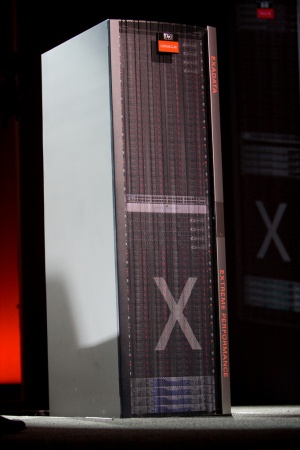Exadata
Oracle Exadata is 'n product family of high-performance data warehouse appliances that is co-developed by both Oracle and HP. As implied by the name, this product will compete directly with teradata.
The idea is to make the storage database aware and push SQL down to the disks for faster scanning. Apparently an Exadata can scan 1 TB of data in about 3.5 seconds by scanning several (or all) disks in parallel with Oracle's Parallel Query technology.
Contents
History[edit]
Exadata was announced by Larry Ellison at the 2008 Oracle OpenWorld conference in San Francisco for immediate delivery. The main headline was that Oracle is entering the hardware business, which is of course not completely true as the hardware is manufactured, delivered and supported by HP. Oracle claims that it is the fastest database server on the planet.
Prerequisites[edit]
- Support for Exadata starts with Oracle 11g release 11.1.0.7.
- Oracle Enterprise Linux
Architecture[edit]
- ASM mirrors and stripes disks between the appliances. ASM failure groups are used to protect the data from disk and appliance failures.
- All storage servers have processors that can execute simplified SQL and will return the requested rows and columns.
- Infiniband is used to connect the appliances to the database server. Spare ports are available for connecting additional blades to the storage cluster.
- An Enterprise Manager plugin is available for managing and monitoring the solution
Technical architecture:
- The libcell library is linked in to talk to cellsrv process.
- cellinit.ora decides which network takes storage traffic.
- cellip.ora - list of cells, new cells can be added dynamically without shutdown
- diskmon handles cell failures
- cellcli is the command line interface and configuration utility
- RS (Restart Server) monitors and restarts other critical processes
- dcli - tool to run commands on all cells
- Set cell_offload_processing parameter to TRUE
- cell_offload_plan_display parameter to predict the effect of moving to Exadata.
Components[edit]
Oracle Exadata consists of the following products:
HP Oracle Exadata Storage Servers[edit]
12 disk drives per cell. All disks can be scanned in parallel for data. Database processing is performed within the storage server. Instead of blocks, result sets are returned to the machine running the database.
HP Oracle Database Machine[edit]
Complete solution with storage (warehouse-in-a-box idea). Includes 50 to 268 TB of storage with infiniband switches. Up to 6 of these servers can be clustered together. Can run Oracle RAC.
Also see[edit]
- Exadata FAQ, frequently asked questions.

